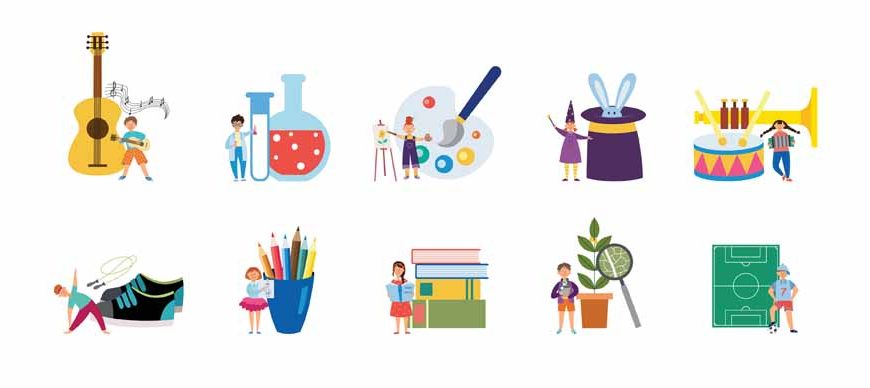“Education is an important thread in the complicated fabric of a child’s development, shaping not only their academic prowess but also nurturing holistic growth. Aside from the pure delight it delivers, teaching music to youngsters provides a slew of cognitive, emotional, and social benefits that will last a lifetime.”
Times of India
Did you know about the benefits of music for students?
From the soothing lullabies that calm a restless baby to the catchy tunes that bring joy to young hearts, music has an innate ability to captivate and connect with people of all ages. Imagine a group of young toddlers humming along to their favourite nursery rhymes while dancing and clapping. In recent years, the significance of music education during early childhood has garnered increasing attention, as researchers uncover a plethora of benefits that extend far beyond mere entertainment. We begin on a lovely voyage through the fascinating world of music in this blog, where lively melodies and harmonious rhythms combine with young minds, nourishing their development and sparking their desire for a lifetime love affair with music.
4 Remarkable Benefits of Music on Children
When young children are exposed to music, it sparks a symphony of positive effects. Here are some notable benefits of music for children. Some of the key reasons for integrating music into their lives…
- Cognitive Development
- Language and Literacy Skills
- Emotional Well-being
- Memory and Attention
Yes, you read that right! There are many cognitive benefits of music. Music engages multiple areas of the brain, fostering enhanced cognitive development in children. According to research, musical instruction aids in the development of spatial-temporal skills, which are essential for mathematics and problem-solving. Moreover, learning music involves pattern recognition and memory skills, which strengthen the brain’s neural connections and promote sharper thinking abilities.
Music and language share common elements, such as rhythm, pitch, and melody. Studies have shown that early exposure to music enhances language and literacy skills in children. Singing songs and nursery rhymes helps children develop their vocabulary, pronunciation, and comprehension. Furthermore, the rhythmic patterns in music enhance phonological awareness, an essential component of reading readiness. Therefore, language and literacy skills are two of the benefits of learning music for your children.
Did you know that improved emotional well-being is one of the key music benefits for students?
Music has a strong emotional influence and can be an effective instrument for emotional expression and regulation. Children can explore a variety of emotions, develop empathy, and learn to describe their feelings through music. Singing or playing an instrument provides an outlet for self-expression and promotes emotional well-being, fostering resilience and coping skills.
Learning and performing music requires focused attention and memorization of notes, lyrics, and melodies. Regular engagement with music helps children enhance their working memory capacity and attention span, skills that are crucial for academic success. Music also provides structure and organisation, allowing children to internalise routines and improve their ability to concentrate on tasks.
For you: Enrol your child in India’s leading preschool network
3 Key Benefits of Learning Music
Beyond the immediate benefits of listening to music, actively learning to play an instrument or sing unlocks a whole new set of advantages. Here are some key benefits of learning music.
- Enhanced Motor Skills
- Increased Discipline and Patience
- Boosted Self-Confidence
Playing an instrument involves fine motor coordination and dexterity. Young children who engage in musical activities develop better hand-eye coordination, finger strength, and overall motor skills. The precise movements required to produce musical notes help refine their motor control, leading to improved manual dexterity.
Learning music demands dedication, discipline, and perseverance. Regular practice sessions instil a sense of commitment and patience in children. They learn to set goals, work towards achieving them, and experience the joy of gradual progress. These qualities cultivated through music education can positively influence other areas of their lives, such as academics and personal growth.
Children’s self-confidence grows as they learn music theory and practise. Playing in a group, participating in recitals, and performing in front of an audience all foster a sense of success and self-assurance. These activities foster a child’s good self-image and raise their self-esteem.
4 Important Benefits of Music Education in Schools
After examining the advantages of music for kids and the advantages of learning music, let’s examine the overall advantages of music education:
- Multidimensional Learning
- Cultural Appreciation and Diversity
- Social Bonding and Collaboration
- Lifelong Love for Music
A range of subjects and skills are combined in music education to create a varied learning environment. Through music, children explore mathematics, language, history, culture, and even science. By connecting these disciplines, music education fosters holistic learning and encourages children to make connections across different domains. Further, music’s importance in student life surpasses entertainment purposes as music acts as a source of inspiration and opens opportunities for your child’s growth.
Music is a universal language that transcends cultural boundaries. Exposing children to a diverse range of musical genres and traditions expands their understanding and appreciation of different cultures. This exposure cultivates empathy, respect, and a sense of global citizenship, fostering a more inclusive and harmonious society.
Music brings people together like no other medium. Engaging in music activities, such as group singing or ensemble playing, promotes teamwork, cooperation, and collaboration. Children learn to listen, communicate, and synchronise their efforts, building valuable social skills and creating lasting friendships.
Introducing music education in early childhood lays a strong foundation for a lifelong love of music. Every child should grow up experiencing the joy, imagination, and beauty of music. This enduring passion for music can enrich their personal and cultural experiences and provide a lifelong source of inspiration and fulfilment. These are the four crucial benefits of music education for your kids at school. Further, understanding the importance of music in education cultivates a deep form of love for culture and arts in students.
Conclusion
As we bid farewell to this captivating exploration of the advantages of introducing music education during early childhood, let us imagine a heartwarming scene—a group of beaming children standing on a stage, clutching their instruments with excitement, ready to perform for their families and friends. To fulfil the dream of your children becoming a musical prodigy we have provided you with details on the 4 benefits of music on kids, 3 advantages of learning music, 4 advantages of music education in schools. Their faces glow with confidence and pride as they create beautiful melodies together, the harmonies echoing through the room. With their dedicated music programs and experienced educators, EuroKids preschool sets the stage for children to unlock their potential and embark on a lifelong journey of learning and musical expression. Let us continue to embrace the harmonies of music as parents, educators, and champions for holistic growth, and give our children the gift of musical education—a gift that will accompany them throughout their lives, enhancing their experiences and nurturing their souls.
For informative and accurate articles on all things related to your new born-toddler’s development, growth, health and nutrition, follow EuroKids Blogs and do check out our nationally recognized preschools – EuroKids for the first step in your kid’s educational journey!

















